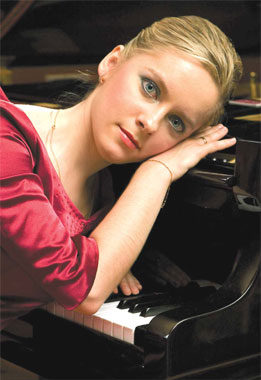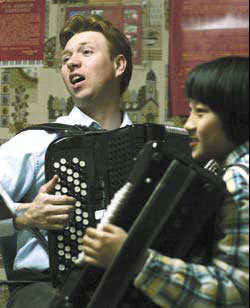 |
|
Svetlana Kudryavtseva is nicknamed "Red Kuva" by her students as she always goes to piano class in formal red dress. |
Little Zhang Jielin's dreams of learning piano were shattered by her teacher's constant criticism. The 7-year-old had lost confidence and vowed never to play again, but something magical happened when she met "Red Kuva".
Svetlana Kudryavtseva is one of 15 Russian teachers making their mark at the Jiangjie Arts and Culture Center in Beijing. Renowned Chinese accordion player, Jiang Jie, set up the school, which now attracts Russia's top musical teachers. But Kuva was not always a fan of the music teaching business.
In 2000, she graduated from Voronezh Academy of Music, 1000 km from Moscow and at the age of 22 started her own music school. Her three-story building housed 50 teachers and 300 students and the young businesswoman's future appeared bright.
"But management work made me focus only on financial affairs, meetings and social appointments, and this took me away from teaching and learning more about piano," she says.
Longing to return to her beloved keyboard, Kuva ended her business venture in 2002 and traveled across Europe, continuing her education.
As her prowess developed, the beautiful Russian woman's keyboard and teaching skills caught the attention of Jiang Jie, who flew to Moscow to make her a special offer.
"I had never been to any Asian countries and it was a great chance for me," she says.
During the first three years in Beijing, cultural differences often confused the young Russian. "Why do Chinese restaurants serve little tomatoes with fruit dishes and why do Chinese students play piano from 7-9 pm followed by 2 hours of homework after a whole day of schooling," she asked herself.
"My real lesson started from a cup of water," she recalls.
A student once handed Kuva a cup of hot water during a lesson and she quickly gulped it down. She soon found herself in hot water, literally.
"Luckily, my tongue was not burned. Russians usually drink cold water or juice, but not in Beijing, where people drink a lot of hot water in the dry weather. Now I'm totally used to it, like many other things."
Both Russia and China share the same cold winters and she recalls Nov 2003 when Beijing was hit by one of the worst snowstorms in history.
Kuva, who was very familiar with snow-covered winters, wasn't fussed by the two-hour bus ride to class. The hard taskmaster, however, was disappointed by two students, who canceled their lessons because of the snow.
"Russia snows heavily from late September to April each year, but it doesn't mean seven months off work," she says. "Soon I learned to change my mindset and get used to thinking in a Chinese way, in a flexible way."
Ever since childhood, Kuva has always dressed formally when playing the piano and students call her "Red Kuva" because of the beautiful red dresses she wears. She also likes wearing black boots. But her students are not just impressed by her appearance.
"She teaches in a totally different way," says Zhang Jielin, the 7-year-old who quit playing piano a year ago and regained her confidence with the help of Kuva.
 |
|
Dmitry Sokolov is another popular Russian music teacher at the Jiangjie Arts and Culture Center. [Courtesy of Svetlana Kudryavtseva] |
"I gave up because my previous Chinese piano teacher said I could hardly comprehend what she taught me. She said I couldn't make progress."
Kuva begins her lesson with a series of interesting finger moves, such as clapping and "flying like an eagle". She tells the students to use their hand to form a little log cabin on the keyboard. The thumb becomes a foldable door while the four fingers act as window flaps. She also tells her students to think of animal sounds, such as a camel's snort, when they play certain chords.
"It's hard for a child to fully focus on reading music and playing piano for 45 minutes, but the warm-up work paves the way for them to practice and help them remember the chords," she says.
She has even taught a 74-year-old man to play a Beethoven sonata. "Each student is unique. I have 60 students, which means I'm expected to think out 60 different ways of teaching. It is the teachers' responsibility to help them out."
Dmitry Sokolov is another popular Russian music teacher at the arts center. The 34-year-old arrived in Beijing in 2000 and was one of the most promising Bayan (chromatic accordion) professors at the Voronezh Academy of Music.
But like many expats in China, he was determined to embrace a new life and career in the Middle Kingdom.
Sokolov is very busy and over a typical weekend he teaches more than 20 students each day. He is famous for his radiant body language, which gives children inspiration.
"I heard about him before I sent my child to the center," says Dai Dongxiang, whose 8-year-old son Dai Yuanhong joined Sokolov's class two years ago.
"Yuanhong enjoys his class, particularly Sokolov's exaggerative moves and singing. He sings to himself while playing accordion at home."
Sokolov was a brilliant student in Moscow, but Russia's economic crisis in 1998 prompted him to rethink his career. In 2001, he gained his Doctoral degree at the Academy of Music in Voronezh, and began teaching on a basic wage of $30 per month. He could make an extra $50 a month playing at government-sponsored events.
But the economic crisis caused the government to cut funding in arts. "I found out it was really a tough life when it was my turn to be a teacher with little pay," he recalls.
But then Sokolov's future took a turn for the better. His tutor Viatcheslav Semionov, a Bayan maestro who had lectured in China twice, was invited again to the Jiangjie arts center, but he sent his star pupil instead.
Sokolov came to Beijing in 2001 and immediately ruffled feathers. He saw a Chinese accordion teacher teaching more than 20 students in a small 60-sqm room and his methods were "inappropriate".
"Some students put the wrong fingers on the keyboard, and didn't use the hand bellow correctly," he said.
"But the worst thing was the teacher hardly had enough time to correct the students."
Over the following three years, he helped teachers from Beijing Accordion Association improve teaching methods, but it wasn't easy.
"They were against me. Although I don't speak Chinese, I can sense what they were saying, " he says.
"To obtain a higher score, Chinese students heading for certificates were all expected to play complicated pieces from a symphony, which were generally unacceptable for classic accordion.
"Thanks to Jiang Jie, who was then the chairman of the association, we started to change the lessons."
Today Sokolov has earned a reputation in and out of Beijing, and is constantly invited by academies of music all around the country, and also serves as a judge in the Beijing International Accordion Competition.
Fellow students of Sokolov in Voronezh Academy of Music followed the same model, like guitarist Vitaly Vasenin and pianist Anastasia Vasenina, who have celebrated their sixth year in Beijing.
These Russian expats in China believe life keeps getting better in their new home.
(China Daily December 29, 2008)